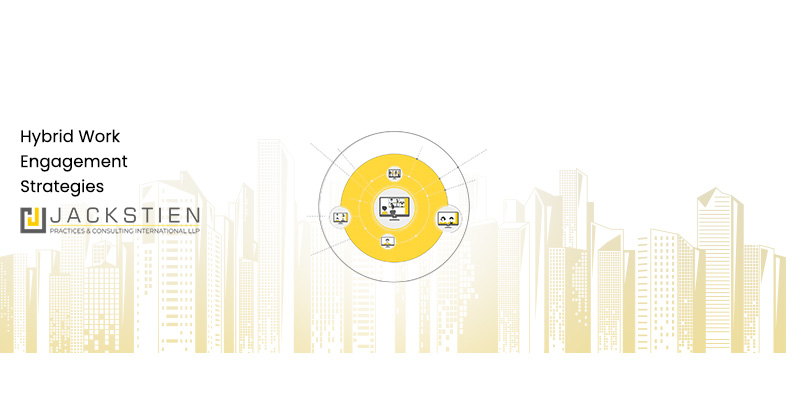Much has been discussed about the future of work as it keeps rapidly evolving, driven by technological advancements, changing workforce demography, and shifting employee expectations.
Beyond the hasty switch of the earlier days of the pandemic, organizations worldwide are attempting to embrace hybrid work models with more care that combines remote and in-office work to maintain productivity, employee engagement, and business continuity.
Hybrid work consultant services have emerged as a critical service, helping businesses navigate this transitional period and effectively mitigate the risks associated with these new ways of working. It is, after all, a specialized domain that requires knowledge of multiple areas as well as how each area relates to every other.
Consulting experts need to be well-versed in the challenges and opportunities presented by this new working landscape to offer valuable insights and practical solutions to help businesses adapt to the future of work, rebuild their internal processes to suit hybrid work and build a more resilient workplace cum workforce. We detail some of the top strategies for effective risk management in hybrid work environments. But first let’s get the basics out of the way.
Flexibility is a wide term
Flexibility may refer to the time when you work.
Flexibility may refer to the space where you work from.
Flexibility may refer to how you deliver.Time-based flexibility may exist either within defined limits or it may be fully discretionary.
Space-based flexibility (i.e. where do you work) may similarly exist within defined limits or may be fully discretionary.
To be sure, the term flexibility may even refer to the fact that you may provide the agreed outcome or work-product using any process of your choosing but without the freedom to choose the space or the time in which you carry out the said process (think about 9 to 5 research labs)
Thus, Hybrid work models, the way typically referred to, are just one form of flexibility and typically refers to flexibility in terms of the space where you work rather than the time when you work. Hybrid work arrangements are thus flexible working arrangements that enable employees to work from various locations, including the office, home, or other remote locations rather than at various times of their choosing.
This approach empowers employees with the autonomy (fully discretionary or within defined boundaries) to choose their work environment based on their preferences and job requirements.
Hybrid work models can take several forms, such as splitting time between remote work, being in the primary office, or being at satellite offices closer to employees’ homes.
Adopting a hybrid work model offers several benefits, including increased employee satisfaction, reduced overhead costs, and access to a broader talent pool. However, it also presents certain challenges, such as managing remote and distributed teams, maintaining effective communication, and ensuring data security. As a result, businesses have needed to develop robust risk management strategies to navigate the complexities of hybrid work successfully. Unfortunately, this has not proven easy and businesses continue to struggle.
The importance of risk management in hybrid work environments
Risk management is a crucial aspect of any business operation, but it becomes even more critical in hybrid work environments. The shift to remote work has introduced new risks and amplified existing ones.
These include process breakdowns, communication lapses and delays, cybersecurity threats and weakened cohesion either impacts product output or timelines or both.
Thus, organizations must identify, assess, and mitigate these risks to ensure business continuity and maintain a healthy hybrid work environment.
Effective risk management in hybrid work environments requires a proactive approach that anticipates potential challenges and addresses them before they escalate. By keeping a pulse on the evolving landscape, organizations can adapt and respond to emerging risks and opportunities, fostering a resilient and adaptable workforce.
Top strategies for effective risk management in hybrid work
a. Identifying potential Hybrid work and workplace risks
The first step in effective risk management is identifying the potential risks associated with hybrid work environments. Some common risks include team cohesion, communication breakdown, weakened discipline, data breaches, loss of productivity, communication challenges, and employee disengagement. Conducting a comprehensive risk assessment to identify these risks and their potential impact on the organization.
This assessment should involve input from various stakeholders, including employees, managers, and IT teams, to ensure a thorough understanding of potential risks. Organizations should also stay informed about industry trends and best practices to anticipate and address emerging risks proactively.
b. Implementing preventative measures
Once potential risks have been identified, organizations must develop and implement preventative measures to mitigate their impact. This may include establishing and updating IT infrastructure and security protocols, identifying and restructuring critical processes, setting a hybrid work policy, establishing clear communication and work guidelines, establishing clear contact points and responsibilities and, crucially, adaptation training for change management.
It is critical to have a proactive approach to risk management of hybrid work, continuously reviewing and updating preventative measures in response to changing circumstances. This requires one to stay informed about best practices, industry trends, and emerging technologies that can help mitigate risks effectively.
c. Continuously monitoring and assessing Hybrid workplace risks for distributed teams
Risk management is an ongoing process that requires continuous monitoring and assessment. Organizations need to establish regular risk assessment schedules, ensuring that all stakeholders are involved in the process. This helps maintain a comprehensive understanding of the organization’s risk landscape and enables timely responses to emerging risks.
In addition to routine assessments, organizations should establish a policy (backed by channels) for employees to report potential risks or concerns. This promotes a culture of risk awareness and empowers employees to contribute to the organization’s risk management efforts.
Advice on communication and collaboration in hybrid work and distributed team structures
Effective communication and collaboration are vital for maintaining productivity and employee engagement in hybrid work environments. Hybrid work consulting experts recommend several strategies to facilitate communication and collaboration, such as:
- Establishing clear communication guidelines and expectations.
- Preferred communication channels, response times
- Meeting protocols including preferred mediums.
- Check-ins structures and team meetings to maintain connections .
- Identifying and securing the right collaboration tools and platforms for the right workflows.
By fostering a culture of effective communication and collaboration, organizations can mitigate the risks associated with remote work and maintain a cohesive, engaged workforce.
Leveraging technology for risk management in hybrid workspaces
Technology plays a crucial role in managing risks associated with hybrid work environments. From collaboration platforms and communication tools to advanced cybersecurity measures, organizations must leverage the right technology solutions to support their hybrid work models effectively.
Most importantly, Hybrid work needs a central command structure that manages the crucial ‘work’ element along with the workplace element. While tools vary by need, intent and output required, the central structure needs to hold it all together.
Unfortunately, in most cases, this role is performed by seat-booking apps, which are really poor substitutes that provide the illusion of structure.Training and development for remote/ hybrid employees and distributed teams
Employee training and development are vital components of risk management in hybrid work environments. By providing employees with the necessary skills and knowledge, organizations can better equip them to navigate the challenges of remote work and contribute to the organization’s risk management efforts.
Hybrid work consulting experts recommend the following training and development strategies for employees in a hybrid work environment:
- Providing regular adaptation training on how remote, hybrid or distributed teams work and relate to each other.
- Training and development programs to supervisors to manage a distributed workforce.
- Understanding what changes and why to equip employees to find solutions better
- Providing cybersecurity best practices to help employees safeguard sensitive data and prevent breaches.
- Training sessions on effective communication and collaboration techniques in a distributed environment, ensuring employees can work together efficiently.
- Providing resources and support for employees to manage their work, home, finances and to maintain balance
How hybrid work consulting services can help your business
Hybrid work consultant services can provide invaluable support to businesses navigating the complexities of the future of work. Experts offer tailored solutions and strategies using systems thinking to help organizations manage risks effectively, implement successful hybrid work models, and build a resilient and adaptable workforce. Some of the key benefits of engaging hybrid work consulting services include:
- Access to expert knowledge and insights on the latest trends and best practices in hybrid work.
- Asking the right questions before arriving at the solutions and risk management strategies.
- Customized risk management strategies designed to address the unique challenges and risks facing your organization.
- Assistance in selecting and implementing the right technology solutions to support your hybrid work model.
- Guidance on developing and implementing effective communication and collaboration strategies to maintain productivity and employee engagement.
Partnering with hybrid work consulting experts enables organizations can confidently embrace the future of work and its challenges, ensuring productivity, continuity and success in the evolving landscape.
Conclusion: Embracing the future of work and its challenges with confidence
The future of work is undeniably complex, with hybrid work models presenting both opportunities and challenges for businesses worldwide. By leveraging the expertise of hybrid work consulting experts and implementing robust risk management strategies, organizations can confidently navigate this new landscape, ensuring business continuity and success. By identifying potential risks, implementing preventative measures, continuously monitoring and assessing risks, and fostering effective communication and collaboration, organizations can mitigate the risks associated with hybrid work environments.
In addition, organizations must prioritize employee training and development, building a resilient and adaptable workforce that can respond to change and navigate challenges effectively. By partnering with hybrid work consulting services, businesses can access expert knowledge and insights, customized risk management strategies, and guidance on selecting and implementing the right technology solutions and communication and collaboration strategies.
While the future of work is undoubtedly challenging, with the right strategies in place, businesses can embrace this new landscape with confidence, build a more resilient and adaptable work structure and ensure long-term success in the evolving business landscape.
If you are looking to navigate the complexities of hybrid work environments and build a more resilient and adaptable workforce, contact our team of hybrid work consulting experts today. We offer tailored solutions and strategies to help your organization mitigate risks, implement successful hybrid work models, and thrive in the future of work.


